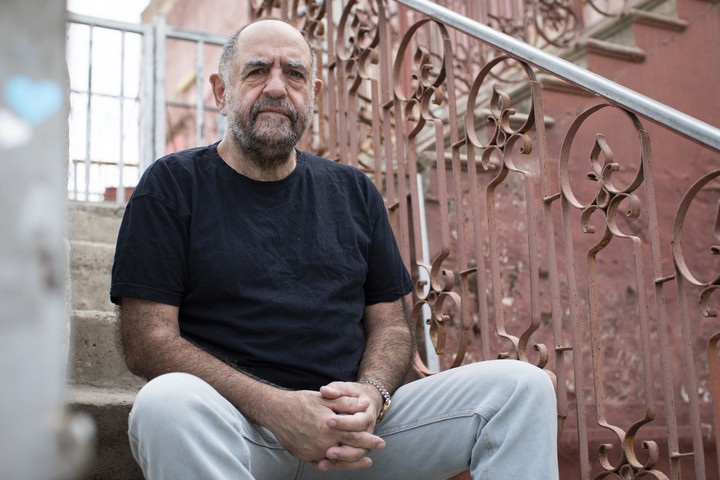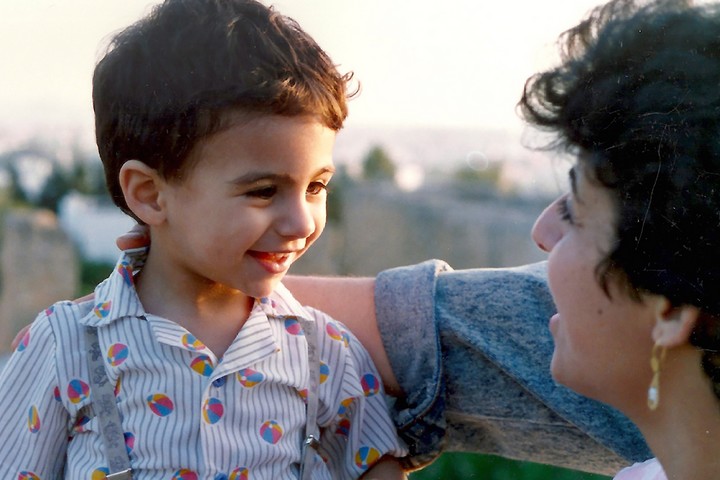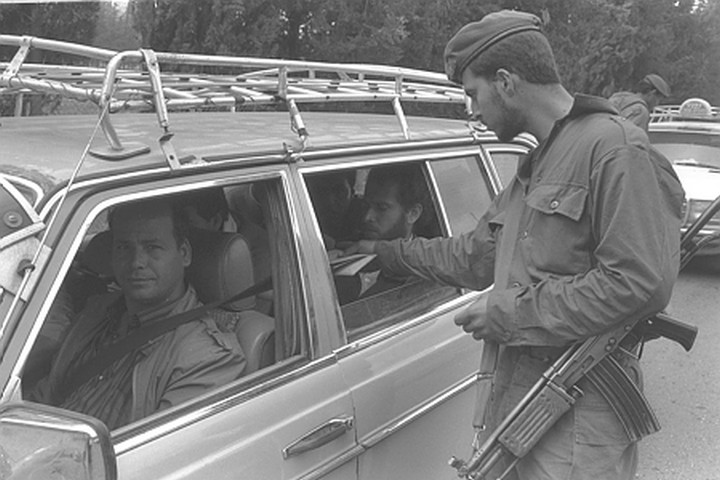In March 1987, Oren Cohen, then a reporter in the occupied territories, received a tip about a female Palestinian detainee who had been tortured and had a miscarriage in prison. Authorities denied she even existed, until Cohen exposed their lies. Today, he says, no one would even care.
By Meron Rapoport

The film industry loves the press. The investigative journalist, the lone wolf who receives a call late at night from an unknown source speaking in a hoarse voice: “Wait for me at the corner of a dark street, I’ll be wearing sunglasses, I have something to tell you.” That’s when the intrepid journalist sets out to expose the truth.
Reality, it turns out, usually looks quite different. In the case of Oren Cohen, it was nearly the opposite of the classic imagery. A reporter for the now defunct Israeli daily Hadashot, Hazan’s biggest scoop was exposing the story of Naila Ayesh, a young Palestinian woman who was arrested while pregnant, tortured to the point of miscarriage, and denied medical treatment. Israel’s defense establishment remained silent about her arrest for a month.
This story, Cohen said, reached the ears of many reporters in March 1987. Roni Ben-Efrat, then an activist with the far-left group, Derech HaNitzotz, which also published a newspaper by the same name, gathered the information about Ayesh in order to gain the interest of Israeli journalists. In an article published by Derech HaNitzotz two weeks after the scandal was exposed, Ben-Efrat said that the information had been in the hands of “senior journalists in the print and television media,” but that they chose not to publish it, since the police denied holding anyone by the name of Naila Ayesh in custody.
In truth, Ayesh was held at the Russian Compound, a notorious police detention and interrogation center in central Jerusalem, for a month. “If it’s a choice between the Palestinian newspaper al-Fajr or the police, I believe the police,” Ben Efrat said, quoting a veteran television reporter explaining why he decided not to publish the story.
Cohen was unconvinced. Even after a year-and-a-half of working as Hadashot‘s correspondent in Gaza, his experience taught him not to believe what the defense establishment says about Palestinians. “In all my years on the job, there was hardly a story that I heard from Palestinians that turned out to be untrue, and I’m talking an incredible level of detail,” said Cohen, who was assigned to cover the occupied territories for most of the First Intifada for Hadashot (Full disclosure: I also worked for Hadashot at the time – MR).
“On the other hand, all the responses I received from officials were completely bogus. I could be in Gaza, tear gas and shooting all around me, with fatalities and causalities, and the military spokesperson would tell me that all was quiet. I developed a lack of trust in the responses of ‘our’ institutions,” he added.
Through a Palestinian contact, Cohen traveled to a refugee camp in Gaza and met Ayesh’s husband, Jamal Zaqut. Zaqut showed him medical documents proving that his wife was pregnant at the time of her arrest. The police continued to deny not only that Ayesh had miscarried, but that she was detained at all. Cohen decided to publish anyway. The story was too powerful: a young woman who was arrested while pregnant told her interrogators about her condition — yet they did not care, telling her, “You’re like a man to us.”

To extract a confession, they put a sack on Ayesh’s head, beat her, deprived her of sleep, left her outdoors in the Jerusalem cold. They ignored her complaints when she said she was hemorrhaging and had lost the baby, and she was denied medical treatment. Other reporters, Ben-Efrat wrote at the time, “believed from the outset that the case was too bad to be true.”
Cohen’s editors backed him up. On March 15, 1987, Hadashot published the story under the headline: “Tortured in custody and miscarried her baby.” It made a big impact. “The next day the police held a press conference and admitted the story was true,” Cohen tells me. “They said they did not lie, because she was in Shin Bet custody, rather than police custody. But what do you call someone who says he does not have a detainee in custody, and in the end it turns out she exists? It’s a lie. They talk to us about Argentina, about people who were disappeared. It happened to us. They made a person disappear.”
The publication helped Ayesh a great deal; she was taken to a medical examination for the first time the following day, after requesting one for weeks. She was released on bail a few days later. Her story is now featured in Just Vision’s new film, “Naila and the Uprising.”
Don’t be afraid, nothing will happen to you
Cohen, a native of Tel Aviv’s Hatikva neighborhood, born to a family of Iraqi origin, says that his political views were already well-established by the time he was sent to cover Gaza and the West Bank. He was raised in the Leftist Hashomer Hatzair youth movement and knew that the occupation was bad. His military service only reinforced these feelings: “I remember walking in Shati refugee camp on the first Land Day and seeing a boy looking at me. He was terrified, he did not know what I was going to do to him,” said Cohen.
In another incident, he received an order to stand in front of a side door of a house in one of the refugee camps and shoot anyone who tried to escape through it. “The door opened,” Cohen recalls, “an old man came out in a jellabiya. I did not open fire, he went in my direction, urinated in his pants in fear, cursed me and the situation. I just stood there waiting for the nightmare to end.” His commanders wanted to put him on trial for sedition following another instance in which he told an elderly Palestinian that the soldiers had taken him from his home so that he could remove a stone barrier in the street. “Don’t be afraid, nothing will happen to you.”
Cohen served as a reporter in Be’er Sheva, and in 1985, two years before the First Intifada broke out, he was appointed to cover Gaza. “I saw it coming,” he says. One of the experiences he remembers best as a reporter in Gaza took place after two young Palestinians were killed by IDF gunfire in Bir Zeit. One of them was from the Shuja’iyya neighborhood in Gaza city, and Cohen drove to the family’s house by himself. “Then, I didn’t feel afraid, we were on the winning side,” he said of the trip. It did not go smoothly. At one point, several young people in the mourners’ home realized that he was an Israeli. They started yelling “Jew! Jew!” and began shoving him. “Someone from the family got up and shouted: ‘No one touch him, it is important that the press in Israel write about us,'” recalled Cohen.
As he left the house, he saw an IDF jeep. But instead of going over to the soldiers and asking them for cover, Cohen got on all fours and began crawling so that the soldiers would not see him. He made it to his car and returned home. In retrospect, he said, he won the Gazans’ heart when they saw he was not on the side of the soldiers.
A few days later, Cohen said, he felt what it was like to be on the other side. Along with Hadashot photographer Israel Yosef, he returned to Gaza to cover the funeral. “All of a sudden, soldiers began shooting in the air,” he recalled, “it was the first time someone shot at me that way. The bullets hit the houses and ricocheted to the ground. I found myself lying on the floor alongside the Palestinians. The photographer disappeared. He ran to the soldiers. But I could not go out and shout ‘Israel, Israel.’ The Palestinians saw that I was with them.”

It was not as if Cohen lost his identity. He remembers an incident in which he attended a meeting between a Fatah leader in Gaza and the activists behind the intifada. The activists asked the official not to speak in Cohen’s presence. The leader reassured them: “Hu Mush Sahyuni” — he is not a Zionist. I am, Cohen corrected him. “But he’s all right,” the Fatah man concluded.
“The only way to see the Palestinian story,” said Cohen in retrospect, “is to be them. Everyone [in the Israeli media] brings the perspective of the soldiers and the politicians. One time, one of my editors told me, ‘I’m fed up with your Arabs.’ I told him I was in the territories and from what I remember, everyone there is an Arab.”
Cohen says he experienced a “huge identity crisis” during and after his time as a reporter in the occupied territories. He could not see soldiers without fearing them. The gap between what is happening in the West Bank and Gaza and what is happening inside Israel was also difficult to digest: “I would return from the territories to Jerusalem, a total of 15 kilometers, a three-minute drive, and I enter a different world. The dissonance was difficult.”
Looking each other in the eyes
Cohen’s family background played a significant role in his identification with the Palestinian side. “I did not speak Arabic at home, but my grandfather spoke no other language. His name was Abdallah.” The Arabic came back to him after wandering around Gaza. “I can recall sitting on the balcony of a villa in Rimal [an upscale neighborhood in Gaza – MR] looking down at the yard. Suddenly I realized that I knew the Arabic names of the flower and the tree in the yard, because my grandfather had the same flower and tree in his yard.”
Cohen felt different from other reporters in the occupied territories, most of whom had served in military intelligence units or the Shin Bet. Although they did not likely identify with the Palestinians the way he did, it was still important for the Israeli press to hear what was happening to the Palestinians — to give their stories a human face. “There was a sensitivity to humanistic stories, faces, names,” Cohen said. “If I were to publish Naila’s story today, no one would care.”
Cohen even remembers an incident in which veteran Israeli journalist Dan Margalit wrote that the reporters in the occupied territories were not fulfilling their duty. “There used to be a time in which every Palestinian casualty had a name, there was a picture of him, not anymore,” Cohen quoted from Margalit’s article. Cohen became upset. On that day, 24 Palestinians were killed during demonstrations against Israel’s assassination of Palestinian leader Abu Jihad in Tunis. The IDF reported three fatalities. Cohen got Margalit’s private number: “I want advice from you,” he told Margalit, “can you help me get their pictures?” Margalit was angry: “The IDF said there were three dead.”
Cohen describes a reality in which not only was the Israeli press concerned about the plight of Palestinians, but Palestinians also sought to speak to and work with Israelis. Thirty years later, that reality seems very far away.
His close relations with Palestinians allowed Cohen to do things that today seem impossible. After interviewing people in Bita, a Palestinian village near Nablus, he got into his car to return to Jerusalem. As he set out, he realized he had a flat tire; somebody had stuck a spike in his wheel. “I look in the mirror and see a bunch of young people following me,” he says. “I realized that if I stop to change the wheel, I would be a goner.”
Cohen recalled that a year earlier, he had interviewed a senior Hamas official in the village whose son had been killed by the IDF. He recalled the way to his house, driving over the fence all the way up to the porch. When the official and his wife emerged from the house, Cohen showed them the spike in his wheel. They immediately recognized him and invited him in. “He called over the young people of the village and asked them what had happened. They explained to him that they had followed me to tell me I had a flat tire. He told them: Go, fix his wheel and bring it back here.” In the end, the young men, who apparently had planned to lynch Cohen, thinking he was a Shin Bet agent, escorted him on his way out of the village.
“They killed his kid, and he saved me,” Cohen says. Cohen’s explanation is simple: “You look someone in the eye, you talk to them, they become a human being.” This is precisely the challenge he faced as a journalist in the occupied territories. “The only way to ignore the Palestinians is to turn them into something sub-human, to say that Palestinian parents send their children to die because they do not care about them.”
The media falls in line
Cohen is not sure that the Israeli media fans the flames of hatred for Palestinians, certainly not intentionally. “I think it wants to align itself with what it thinks the public wants to hear,” says Cohen. “I remember Ehud Yaari demanding we “crush the head of the snake’’ of Saddam Hussein. For heaven’s sake, he may be a dictator, but you are a journalist. We look at all the Arabs, including the Palestinians, as a single, menacing bloc, unable to assess the power relations: who supports whom, who is with us and who is against us?”
Like the case of Ayesh, Cohen believes the Israeli media tends to buy into the stories peddled by the defense establishment. He remembers a story in which the police issued a statement that a car bomb had been discovered near the Jerusalem International Convention Center, close to the hotel where the U.S. secretary of state was staying. I went to the convention center and heard an officer say that the car bomb was as dangerous as a car full of journalists. The IDF censor prevented me from publishing the quote. Years later, I spoke about the incident at an IDF Spokesperson’s college seminar, and said that I believe the car bomb was deliberately staged to show the American secretary of state how dangerous it is here. A man from the IDF Spokesperson’s Unit got up and said, ‘You’re right.'”
The IDF Spokesperson’s Unit, Cohen said, works in a sophisticated manner. It does not hold steadfast to any one version of a story; that way the army could always claim plausible deniability, and the public buys it. “In the eyes of the public I was a liar, a traitor who speaks out against Israel,” he said. But there were other moments, too. “Yossi Klein [the editor-in-chief of Hadashot – MR] showed me a letter from a reservist who served in Gaza and wrote that Hadashot should be proud that I am reporting about exactly what is happening, and that the IDF Spokesperson’s denials are untrue.”
After leaving Hadashot, Cohen served as the head of the current affairs department at Army Radio, and today he works as an editor for Israeli financial newspaper, Calcalist. He does not cover the occupied territories, but he keeps in touch with some of his Palestinian friends, mostly by phone. His son, Tom, absorbs Arabic culture through music. He is the conductor and musical director of the Jerusalem Orchestra East West.
During the Oslo Accords, Cohen took part in the euphoria. “The flowers and the rice and the olive branches that were given to the soldiers — that was real,” he said. “It was something that we destroyed — and they also destroyed it. The buses that blew up is not something that can be overcome.”
In those days, the Palestinians were willing to settle for a state. Cohen remembered a friend from Gaza who described in detail his family’s home in Be’er Sheva from before the founding of Israel, but said: “Give me a state and don’t worry about what I had.” Today, Cohen believes we have passed the point of no return — that it is impossible to separate between Israelis and Palestinians.
Nevertheless, even today, Cohen believes that it would be easiest for Israel to make peace with the Palestinians. He remembers accompanying then-Defense Minister Yitzhak Rabin on a visit to Manara Square in Ramallah. “People came to him and told him: ‘why are you doing this to us?'” Cohen recalled. “Only those who feel they have something in common with us, even if we are engaged in a conflict with them — can say something like this. They are the only people with which we can have real peace — not peace between leaders. They know us most intimately, and that’s what hurts the most.”
Translated by Yoni Molad for Middle East News Service edited by Sol Salbe, Melbourne, Australia. This article was first published in Hebrew on Local Call. Read it here.
